
Research
Spanning every urgent social issue from climate change to political economy and gender discrimination to global conflict, the Wheeler Institute supports research into emerging markets and developing nations.
- The Ripple Effects of Export Boom: A Case Study in Uruguay Beef Export
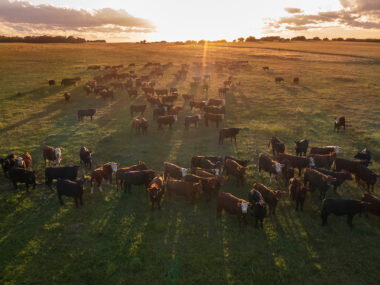 On 14th March 2024, as part of the Private Sector Development Research Network (PSDRN), the Wheeler Institute for Business and Development hosted a seminar: “Beefing up the service sector: Commodity exports to China and production network spillover.” Led by Giorgio Chiovelli (Associate Professor of Economics at Universidad de Montevideo and former LBS Research Fellow) and moderated…
On 14th March 2024, as part of the Private Sector Development Research Network (PSDRN), the Wheeler Institute for Business and Development hosted a seminar: “Beefing up the service sector: Commodity exports to China and production network spillover.” Led by Giorgio Chiovelli (Associate Professor of Economics at Universidad de Montevideo and former LBS Research Fellow) and moderated… - The role of concessionary companies and private enterprises in colonising sub-Saharan Africa
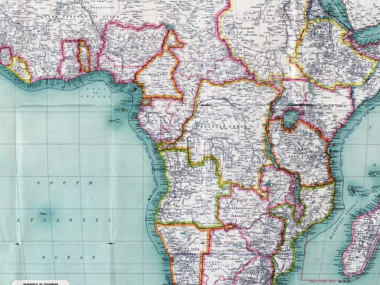 As part of the Private Sector Development Research Network (PSDRN), the Wheeler Institute for Business and Development hosted an insightful webinar on the role of concessionary companies and private enterprises in colonising sub-Saharan Africa. The webinar took place on Friday, 31st January 2025, from 2-3pm GMT and was led by Etienne Le Rossignol, Postdoctoral Researcher…
As part of the Private Sector Development Research Network (PSDRN), the Wheeler Institute for Business and Development hosted an insightful webinar on the role of concessionary companies and private enterprises in colonising sub-Saharan Africa. The webinar took place on Friday, 31st January 2025, from 2-3pm GMT and was led by Etienne Le Rossignol, Postdoctoral Researcher… - Call for Proposals
 Applications are now closed. We are calling for cutting-edge research proposals from LBS faculty, post-doctoral students, research fellows and PhD students from year 1. This is the second year Call for Proposals are being supported by the Sui Foundation, and we encourage and support research at the intersection of business and development, with a particular…
Applications are now closed. We are calling for cutting-edge research proposals from LBS faculty, post-doctoral students, research fellows and PhD students from year 1. This is the second year Call for Proposals are being supported by the Sui Foundation, and we encourage and support research at the intersection of business and development, with a particular… - New Research on Taxes and Transparency Regulation for Sustainability
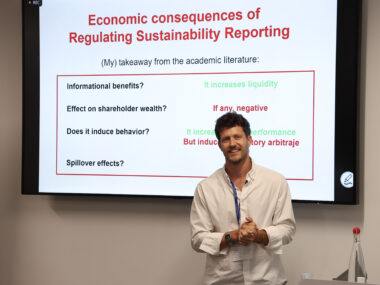 The final session of the Tax Bootcamp 2024 at London Business School was focussed on two research papers, centred around tax and ESG in different geographical regions including developing countries. Each was presented by one of the researchers, discussed by an independent academic, and assessed for policy implications by a third party. This article is…
The final session of the Tax Bootcamp 2024 at London Business School was focussed on two research papers, centred around tax and ESG in different geographical regions including developing countries. Each was presented by one of the researchers, discussed by an independent academic, and assessed for policy implications by a third party. This article is… - Taxes for Climate Action Across the World
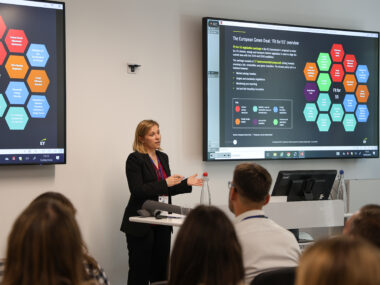 The second session of the Tax Bootcamp 2024, held at London Business School and supported by the Wheeler Institute, moved the conversation away from AI towards taxation and climate action. It was structured around presentations from two speakers, each representing diverse perspectives on climate action from both Europe and the United States on taxation for…
The second session of the Tax Bootcamp 2024, held at London Business School and supported by the Wheeler Institute, moved the conversation away from AI towards taxation and climate action. It was structured around presentations from two speakers, each representing diverse perspectives on climate action from both Europe and the United States on taxation for… - Tax Strategies and the Technological Revolution: Accounting for AI
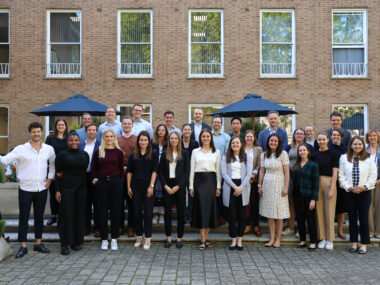 Last month London Business School hosted the Tax Bootcamp 2024, led by Marcel Olbert (Assistant Professor of Accounting at London Business School) and Rebecca Lester (Associate Professor of Accounting and Senior Fellow at Stanford Institute for Economic Policy Research), and supported by the Wheeler Institute. Building on the 2023 Global Tax Conference at LBS, the…
Last month London Business School hosted the Tax Bootcamp 2024, led by Marcel Olbert (Assistant Professor of Accounting at London Business School) and Rebecca Lester (Associate Professor of Accounting and Senior Fellow at Stanford Institute for Economic Policy Research), and supported by the Wheeler Institute. Building on the 2023 Global Tax Conference at LBS, the…
Applied research
We bridge the gap between theory and practice through collaborative efforts and teaching, translating cutting-edge research into actionable solutions for real-world challenges.
- Geographic Information System workshop
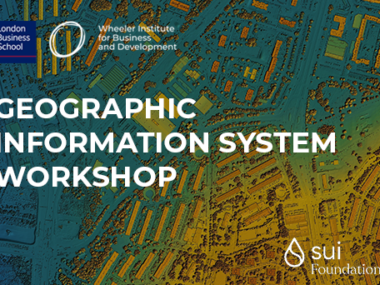 Applications are now closed Due to the high volume of registrations, applications for the GIS workshop 2025 have now closed. Date: Tuesday 13 May – Thursday 29 May 2025Time: 15:00 – 18:00 British Standard Time (BST). The Wheeler Institute is pleased to be offering a new edition of a virtual online workshop on GIS methods…
Applications are now closed Due to the high volume of registrations, applications for the GIS workshop 2025 have now closed. Date: Tuesday 13 May – Thursday 29 May 2025Time: 15:00 – 18:00 British Standard Time (BST). The Wheeler Institute is pleased to be offering a new edition of a virtual online workshop on GIS methods… - Research of Paolo Surico featured by the UK Chancellor
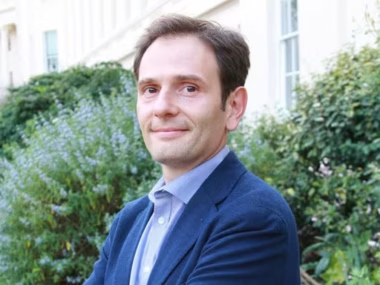 In the recent UK Chancellor’s Spring Statement, the Chancellor Rachel Reeves set out the UK budget and spending plans. In the Treasury press release the research of Paolo Surico, Professor of Economics at London Business School (LBS) was featured prominently, particularly his paper The Long-Run Effects of Government Spending (American Economic Review, with Juan Antolin-Diaz, PhD candidate at LBS). Chris…
In the recent UK Chancellor’s Spring Statement, the Chancellor Rachel Reeves set out the UK budget and spending plans. In the Treasury press release the research of Paolo Surico, Professor of Economics at London Business School (LBS) was featured prominently, particularly his paper The Long-Run Effects of Government Spending (American Economic Review, with Juan Antolin-Diaz, PhD candidate at LBS). Chris… - Elias Papaioannou and African History Lecture Series Highly Commended by the Financial Times
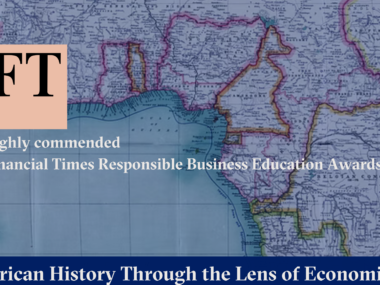 We are honoured to share that Elias Papaioannou, Professor of Economics at London Business School (LBS) and Co-Academic Director of the Wheeler Institute, and the Wheeler Institute’s African History Through the Lens of Economics lecture series, have been highly commended in this year’s Responsible Business Education Awards by the Financial Times. The lecture series drew…
We are honoured to share that Elias Papaioannou, Professor of Economics at London Business School (LBS) and Co-Academic Director of the Wheeler Institute, and the Wheeler Institute’s African History Through the Lens of Economics lecture series, have been highly commended in this year’s Responsible Business Education Awards by the Financial Times. The lecture series drew… - The Power of Business – Lessons in Balancing Family and Work
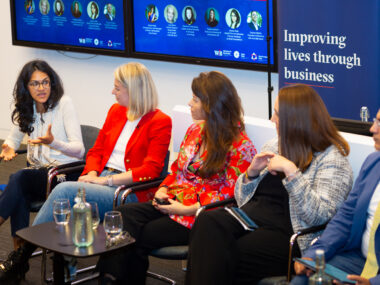 The Wheeler Institute for Business and Development, in partnership with Dharma Life Labs, hosted the Power of Business: Bringing together global and local voices event, featuring two panel discussions that explored how businesses can drive meaningful social impact. This blog is about the second panel, Flourishing Careers, Flourishing Children: Lessons in Balancing Family and Work.…
The Wheeler Institute for Business and Development, in partnership with Dharma Life Labs, hosted the Power of Business: Bringing together global and local voices event, featuring two panel discussions that explored how businesses can drive meaningful social impact. This blog is about the second panel, Flourishing Careers, Flourishing Children: Lessons in Balancing Family and Work.… - The Power of Business – Innovating to Empower
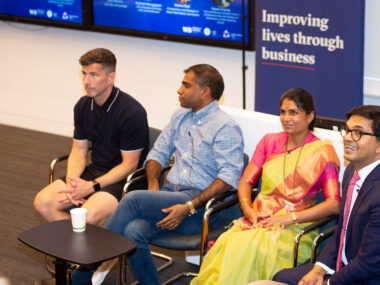 The Wheeler Institute for Business and Development, in partnership with Dharma Life Labs, hosted the Power of Business: Bringing together global and local voices event, featuring two panel discussions that explored how businesses can drive meaningful social impact. This blog is about the first panel – Innovating to Empower. We were proud to welcome a…
The Wheeler Institute for Business and Development, in partnership with Dharma Life Labs, hosted the Power of Business: Bringing together global and local voices event, featuring two panel discussions that explored how businesses can drive meaningful social impact. This blog is about the first panel – Innovating to Empower. We were proud to welcome a… - Geographic Information System workshop
 Applications are now closed Due to the high volume of registrations, applications for the GIS workshop 2024 have now closed. Date: Tuesday 7 May – Thursday 23 May Time: 15:00 – 18:00 British Standard Time (BST) The Wheeler Institute for Business and Development at London Business School (LBS) is offering a virtual online workshop on…
Applications are now closed Due to the high volume of registrations, applications for the GIS workshop 2024 have now closed. Date: Tuesday 7 May – Thursday 23 May Time: 15:00 – 18:00 British Standard Time (BST) The Wheeler Institute for Business and Development at London Business School (LBS) is offering a virtual online workshop on…
